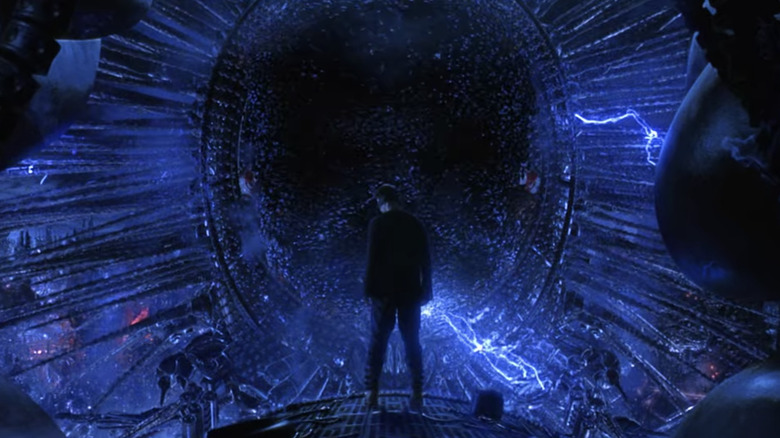The Matrix Resurrections' Deus Machina Explained
This post contains heavy spoilers for "The Matrix Resurrections."
In "The Matrix Resurrections," Thomas Anderson (Keanu Reeves) is back at his desk on the floor of an office building, but this time, he's not stuck in a cubicle. In fact, he's got a much nicer office because he's the greatest video game designer of his generation.
In "The Matrix," Mr. Anderson — as Agent Smith (Hugo Weaving) takes to calling him — is "a program writer for a respectable software company," MetaCortex. As Smith puts it, his other life "is lived in computers, where [he goes] by the hacker alias Neo."
"The Matrix Resurrections" makes the new Smith, played by Jonathan Groff, Neo's business partner at a video game company called Deus Machina. This new company takes the place of MetaCortex, and you can see its name during the building evacuation, where Neo first makes contact with the new Morpheus (Yahya Abdul-Mateen II).
Director Lana Wachowski uses it as a meta device for commenting on the nature of this fourth "Matrix" movie. In "The Matrix Resurrections," the original "Matrix" film trilogy exists in-universe, but as a trilogy of games that Neo designed at Deus Machina. When we first meet the new Smith, he calls Neo into his office, much like Anderson's boss did in "The Matrix." Instead of dressing him down, he sits him down and explains, "Our beloved parent company, Warner Bros., has decided to make a sequel to the trilogy."
This leads into a montage where Christina Ricci makes a cameo, talking about focus group research at a meeting, and we see the writers' room (or designers' room) brainstorming ideas for the fourth game. Over and above all these meta shenanigans, however, the name Deus Machina also serves as a callback to "The Matrix Revolutions."
The Matrix Revolutions Link
Deus ex machina is a well-known Latin phrase, which means, "god out of the machine." We often use it to talk about plot contrivances where an outside force with no previous involvement in the narrative suddenly comes in to affect its resolution.
"The Matrix Revolutions," the third installment in the "Matrix" film series, used this same phrase as the name of the central interface in the machine city. Though he's blinded and blindfolded at this point, Neo comes face-to-face with the Deus Ex Machina, as the machines swarm together and give it a baby-like appearance. Neo negotiates with it and convinces it to let him to go back into the Matrix to stop Smith, in exchange for a real-world ceasefire that will bring peace to the human city of Zion.
In "The Matrix Resurrections," we learn that the machines, led by the Analyst (Neil Patrick Harris), resurrected Neo after he died in his final showdown with Smith. It seems that Smith was left tethered to Neo, unconscious himself of his true identity, because when Neo flirts with leaving the Matrix during the building evacuation, Smith awakens to his old self. And he later says that Neo escaping the Matrix again freed him up to be himself again.
The Analyst has convinced Neo that he is crazy and that his memories of his experiences in the "Matrix" trilogy are not real. However, the name Deus Machina functions as a little Easter-egg reminder of the end of that trilogy and a hint that there is more going on here than meets the eye.
"The Matrix Resurrections" is playing in theaters and on HBO Max now.

